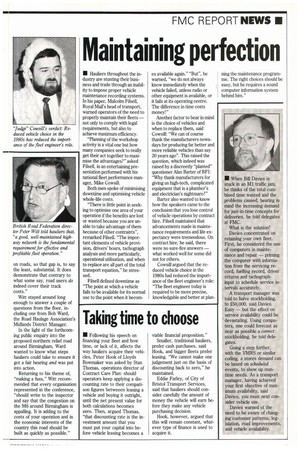Maintaining perfection
Page 37

If you've noticed an error in this article please click here to report it so we can fix it.
• Hauliers throughout the industry are stunting their business and trade through an inability to impose proper vehicle maintenance recording systems. In his paper, Malcolm Royal Mail's head of transport, warned operators of the need to properly maintain their fleets — not only to comply with legal requirements, but also to achieve maximum efficiency.
"Planning of the workshop activity is a vital one but how many companies seek to really get their act together to maximise the advantages?" asked Filsell, in an entertaining presentation performed with his national fleet performance manager, Mike Cowsill.
Both men spoke of minimising downtime and optimising vehicle whole-life costs.
"There is little point in seeking to optimise one area of your operation if the benefits are lost or wasted because you are unable to take advantage of them because of other contraints", remarked Filsell. "The important elements of vehicle provision, drivers' hours, tachograph analysis and more particularly, operational utilisation, and when to replace are all part of the total transport equation," he stressed.
Filsell defined downtime as "The point at which a vehicle fails to be available for its normal use to the point when it becom es available again." "But", he warned, "we do not always know immediately when the vehicle failed, unless radio or other equipment is available, or it fails at its operating centre. The difference in time costs money!"
Another factor to bear in mind is the choice of vehicles and when to replace them, said Cowsill: "We can of course thank the manufacturers nowadays for producing far better and more reliable vehicles than say 20 years ago". This raised the question, which indeed was raised by a discreetly "planted" questioner Alan Barter of BFI: "Why thank manufacturers for giving us high-tech, complicated equipment that is a plumber's and electrician's nightmare?"
Barter also wanted to know how the speakers came to the conclusion that you lose control of vehicle operations by contract hire. Filsell maintained that advancements made in maintenance requirements and life expectancy were tremendous. On contract hire, he said, there were no sure-fire answers — what worked well for some did not for others.
Cowsill argued that the reduced vehicle choice in the 1980s had reduced the importance of the fleet engineer's role: "The fleet engineer today is required to be more precise, knowledgable and better at plan ning the maintenance programme. The right choices should be easy, but he requires a sound computer information system behind him."
















































































































